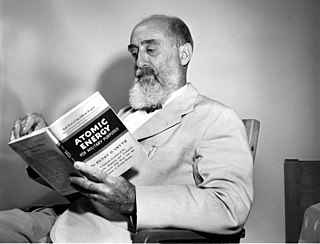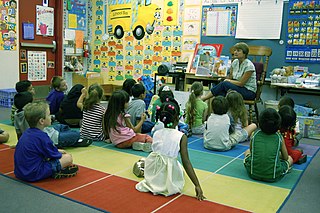
Developmental psychology is the scientific study of how and why human beings change over the course of their life. Originally concerned with infants and children, the field has expanded to include adolescence, adult development, aging, and the entire lifespan. Developmental psychologists aim to explain how thinking, feeling, and behaviors change throughout life. This field examines change across three major dimensions: physical development, cognitive development, and social emotional development. Within these three dimensions are a broad range of topics including motor skills, executive functions, moral understanding, language acquisition, social change, personality, emotional development, self-concept, and identity formation.

In sociology, socialization is the process of internalizing the norms and ideologies of society. Socialization encompasses both learning and teaching and is thus "the means by which social and cultural continuity are attained".

The Montessori method of education is an educational method developed by Italian physician Maria Montessori. Emphasizing independence, it views children as naturally eager for knowledge and capable of initiating learning in a sufficiently supportive and well-prepared learning environment. It discourages some conventional measures of achievement, such as grades and tests. Montessori developed her theories in the early 1900s through scientific experimentation with her students; the method has since been used in many parts of the world and in public and private schools alike.

A preschool, also known as nursery school, pre-primary school, or play school, is an educational establishment or learning space offering early childhood education to children before they begin compulsory education at primary school. It may be publicly or privately operated, and may be subsidised from public funds.

Early childhood education is a branch of education theory that relates to the teaching of children from birth up to the age of eight. Traditionally, this is up to the equivalent of third grade. ECE emerged as a field of study during the Enlightenment, particularly in European countries with high literacy rates. It continued to grow through the nineteenth century as universal primary education became a norm in the Western world. In recent years, early childhood education has become a prevalent public policy issue, as municipal, state, and federal lawmakers consider funding for preschool and pre-K. The global priority placed on early childhood education is underscored with targets of the United Nations Sustainable Development Goal 4. It is described as an important period in a child's development. It refers to the development of a child's personality. ECE is also a professional designation earned through a post-secondary education program. For example, in Ontario, Canada, the designations ECE and RECE may only be used by registered members of the College of Early Childhood Educators, which is made up of accredited child care professionals who are held accountable to the College's standards of practice.
The Reggio Emilia approach is an educational philosophy and pedagogy focused on preschool and primary education. This approach is a student-centred and constructivist self-guided curriculum that uses self-directed, experiential learning in relationship-driven environments. The programme is based on the principles of respect, responsibility and community through exploration, discovery and play.

Reading for special needs has become an area of interest as the understanding of reading has improved. Teaching children with special needs how to read was not historically pursued due to perspectives of a Reading Readiness model. This model assumes that a reader must learn to read in a hierarchical manner such that one skill must be mastered before learning the next skill. This approach often led to teaching sub-skills of reading in a decontextualized manner. This style of teaching made it difficult for children to master these early skills, and as a result, did not advance to more advanced literacy instruction and often continued to receive age-inappropriate instruction.

Reading readiness has been defined as the point at which a person is ready to learn to read and the time during which a person transitions from being a non-reader into a reader. Other terms for reading readiness include early literacy and emergent reading.

The Individuals with Disabilities Education Act (IDEA) is a piece of American legislation that ensures students with a disability are provided with Free Appropriate Public Education (FAPE) that is tailored to their individual needs. IDEA was previously known as the Education for All Handicapped Children Act (EHA) from 1975 to 1990. In 1990, the United States Congress reauthorized EHA and changed the title to IDEA. Overall, the goal of IDEA is to provide children with disabilities the same opportunity for education as those students who do not have a disability.
KinderCare Learning Centers is an American operator of for-profit child care and early childhood education facilities founded in 1969 and currently owned by KinderCare Education based in Portland, Oregon. The company provides educational programs for children from six weeks to 12 years old. KinderCare is the third-largest privately held company headquartered in Oregon. In 39 states and the District of Columbia, some 200,000 children are enrolled in more than 1,600 early childhood education community centers, over 600 before-and-after school programs, and over 100 employer-sponsored centers.
Project STAR was three-year, federally funded research project which consisted of an intervention with preschoolers enrolled in the Head Start program in Lane County, Oregon, United States. The project was conducted from 1999 to 2003 by the Early Childhood Research Unit of the University of Oregon College of Education. The principal investigators were Dr. Ruth Kaminski, one of the co-authors of the DIBELS early literacy assessment, and Beth Stormshak. The goal of the program was to increase literacy skills of at-risk children by improving their learning environments by increasing the number of planned and focused activities. The curriculum had two components: a classroom ecology component and family-focused intervention activities. The intervention was focused on strengthening children's skills in social ability. In order to help children they increased parenting and family participation in school by working directly with the parents of the students.

The Waverly School is a nonsectarian, coeducational, college preparatory, progressive day school located in Pasadena, California, United States. The Waverly School spans preschool through high school and has three separate campuses plus a one-acre organic farm within walking distance. The Waverly School qualifies as an independent school.
Developmental coordination disorder (DCD), also known as developmental motor coordination disorder, developmental dyspraxia or simply dyspraxia, is a chronic neurological disorder beginning in childhood. It is also known to affect planning of movements and co-ordination as a result of brain messages not being accurately transmitted to the body. Impairments in skilled motor movements per a child's chronological age interfere with activities of daily living. A diagnosis of DCD is then reached only in the absence of other neurological impairments such as cerebral palsy, multiple sclerosis, or Parkinson's disease.
Developmentally appropriate practice is a perspective within early childhood education whereby a teacher or child caregiver nurtures a child's social/emotional, physical, and cognitive development. It is also described as a philosophy in child education that is based on child development knowledge where professionals base their instruction and care on research, standards, and recognized theory.

Child development involves the biological, psychological and emotional changes that occur in human beings between birth and the conclusion of adolescence. The main 3 stages of life include early childhood, middle childhood, and adolescence. Early childhood typically ranges from infancy to the age of 6 years old. During this period, development is significant, as many of life's milestones happen during this time period such as first words, learning to crawl, and learning to walk. There is speculation that middle childhood, or ages 6-12 are the most crucial years of a child's life, ranging from the starts of some sorts of formal schooling to the beginning of puberty, and this is also the period where many children start to gain a more sense of self. Adolescence, is the stage of life that typically starts around the time puberty hits, all the way up until legal adulthood. In the course of development, the individual human progresses from dependency to increasing autonomy. It is a continuous process with a predictable sequence, yet has a unique course for every child. It does not progress at the same rate and each stage is affected by the preceding developmental experiences. Because genetic factors and events during prenatal life may strongly influence developmental changes, genetics and prenatal development usually form a part of the study of child development. Related terms include developmental psychology, referring to development throughout the lifespan, and pediatrics, the branch of medicine relating to the care of children.

Dr. Lilli Nielsen was a Danish psychologist in the field of teaching blind children and those with multiple disabilities. She has written several books on the subject.
Partners in Development Foundation (PIDF), an IRS Section 501(c)(3) non-profit public foundation, was incorporated in 1997 in Honolulu, Hawaiʻi. It has established and implemented programs in the areas of education, social services, Hawaiian culture, Hawaiian language, and preservation of the natural environment and traditional Hawaiian agriculture. These programs now have served close to ten thousand people in communities throughout Hawai‘i. In 2011, PIDF received grants of more than $1.6 million from the US Department of Education through the Native Hawaiian Education Act. The grants were awarded for the purpose of continuing, expanding, and improving the educational programs of PIDF.
Separation anxiety disorder (SAD) is an anxiety disorder in which an individual experiences excessive anxiety regarding separation from home and/or from people to whom the individual has a strong emotional attachment. It is most common in infants and small children, typically between the ages of six to seven months to three years, although it may pathologically manifest itself in older children, adolescents and adults. Separation anxiety is a natural part of the developmental process. Unlike SAD, normal separation anxiety indicates healthy advancements in a child's cognitive maturation and should not be considered a developing behavioral problem.
A late talker is a toddler experiencing late language emergence (LLE). LLE can also be an early or secondary sign of an autism spectrum disorder, or other developmental disorders, such as attention deficit hyperactivity disorder, intellectual disability, learning disability, social communication disorder, or specific language impairment. Late talkers are children who are intellectually abled, but do not show signs of normal language development for their age. Lack of language development, comprehension skills and challenges with literacy skills are potential risks as late talkers age. Outlook for late talkers with or without intervention is generally favorable. Toddlers have a high probability of catching up to typical toddlers if early language interventions are put in place. Language interventions include general language stimulation, focused language stimulation and milieu teaching.

Kindergarten readiness refers to the developmental domains that contribute to children's ability to adapt to the kindergarten classroom, which is often a new and unfamiliar environment. There is no single agreed upon definition of Kindergarten readiness. The domains often included in the definition include, academic skills, social-emotional development, and physical development. In addition to these competencies, the child's environment and opportunities for learning should also be considered. This includes the child's home environment and their interactions with teachers and peers.










